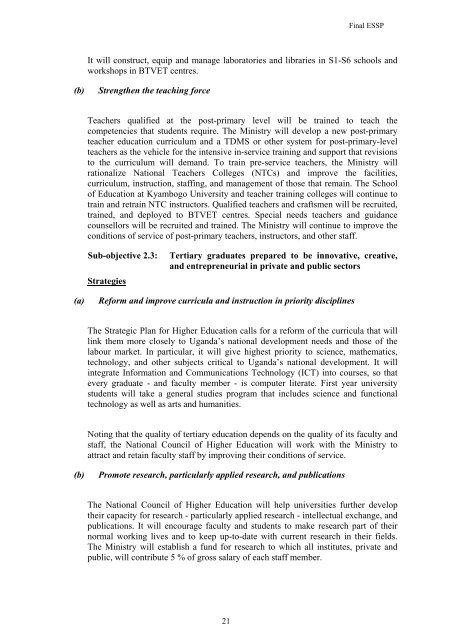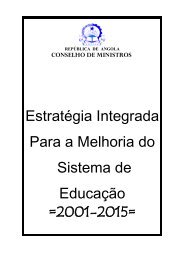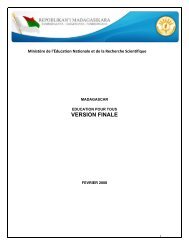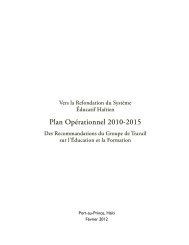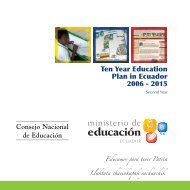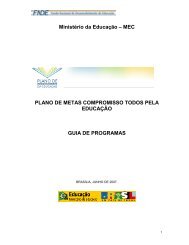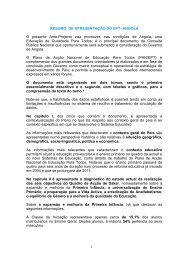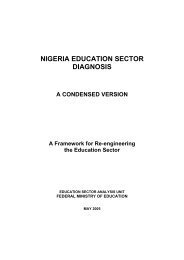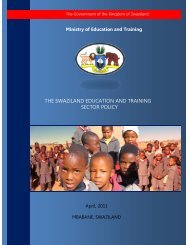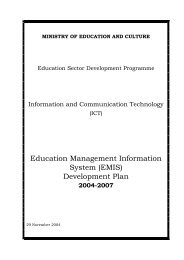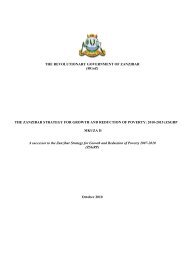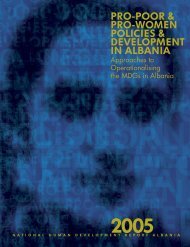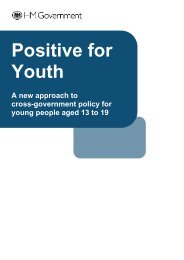Education Sector Strategic Plan 2004-2015 - Planipolis
Education Sector Strategic Plan 2004-2015 - Planipolis
Education Sector Strategic Plan 2004-2015 - Planipolis
Create successful ePaper yourself
Turn your PDF publications into a flip-book with our unique Google optimized e-Paper software.
Final ESSP<br />
It will construct, equip and manage laboratories and libraries in S1-S6 schools and<br />
workshops in BTVET centres.<br />
(b) Strengthen the teaching force<br />
Teachers qualified at the post-primary level will be trained to teach the<br />
competencies that students require. The Ministry will develop a new post-primary<br />
teacher education curriculum and a TDMS or other system for post-primary-level<br />
teachers as the vehicle for the intensive in-service training and support that revisions<br />
to the curriculum will demand. To train pre-service teachers, the Ministry will<br />
rationalize National Teachers Colleges (NTCs) and improve the facilities,<br />
curriculum, instruction, staffing, and management of those that remain. The School<br />
of <strong>Education</strong> at Kyambogo University and teacher training colleges will continue to<br />
train and retrain NTC instructors. Qualified teachers and craftsmen will be recruited,<br />
trained, and deployed to BTVET centres. Special needs teachers and guidance<br />
counsellors will be recruited and trained. The Ministry will continue to improve the<br />
conditions of service of post-primary teachers, instructors, and other staff.<br />
Sub-objective 2.3: Tertiary graduates prepared to be innovative, creative,<br />
and entrepreneurial in private and public sectors<br />
Strategies<br />
(a) Reform and improve curricula and instruction in priority disciplines<br />
The <strong>Strategic</strong> <strong>Plan</strong> for Higher <strong>Education</strong> calls for a reform of the curricula that will<br />
link them more closely to Uganda’s national development needs and those of the<br />
labour market. In particular, it will give highest priority to science, mathematics,<br />
technology, and other subjects critical to Uganda’s national development. It will<br />
integrate Information and Communications Technology (ICT) into courses, so that<br />
every graduate - and faculty member - is computer literate. First year university<br />
students will take a general studies program that includes science and functional<br />
technology as well as arts and humanities.<br />
Noting that the quality of tertiary education depends on the quality of its faculty and<br />
staff, the National Council of Higher <strong>Education</strong> will work with the Ministry to<br />
attract and retain faculty staff by improving their conditions of service.<br />
(b) Promote research, particularly applied research, and publications<br />
The National Council of Higher <strong>Education</strong> will help universities further develop<br />
their capacity for research - particularly applied research - intellectual exchange, and<br />
publications. It will encourage faculty and students to make research part of their<br />
normal working lives and to keep up-to-date with current research in their fields.<br />
The Ministry will establish a fund for research to which all institutes, private and<br />
public, will contribute 5 % of gross salary of each staff member.<br />
21


